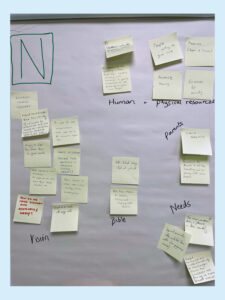Fé Resiliente
Você pode visualizar ou baixar os PDFs das apresentações deste evento abaixo.
[embedpress_pdf]https://staging.gcf.community/wp-content/uploads/2023/07/Forming-Resilient-Faith-London.pdf[/embedpress_pdf] [embedpress_pdf]https://staging.gcf.community/wp-content/uploads/2023/07/FFG-Intro-to-FaithFull-Gen-2023.pdf[/embedpress_pdf]Vídeos
Você pode ver os vídeos aos quais nos referimos na apresentação abaixo.
Play Video Aim Lower Play Video 2023 Child Discipleship Forum Promo Play Video The brite Future of the ChurchNotas resumidas
Our meeting on “Resilient Faith” was a rich exploration of the challenges and opportunities facing child discipleship in a post-Christian, hyper-individualised society. The principal theme was the necessity of counter-cultural formation and the integration of new knowledge and tools into discipleship practices. We explored the metaphor of outdated maps which served as a powerful symbol of the need for churches to update their approaches to discipleship, and discussed the impact of cultural formation, the idea of counter formation, and the need for a new approach in the face of a rapidly changing world.
We discussed the importance of forming lasting faith in children through discipleship. Awana shared a framework of “cultural formation” (how the surrounding culture shapes children) versus “counter formation” (intentional efforts to shape children’s faith).
A formação cultural refere-se ao processo pelo qual as crianças são moldadas pelas culturas predominantes nas suas sociedades. Este processo varia muito dependendo do contexto cultural. Por exemplo, uma criança que crescesse no Iraque seria formada numa cultura predominantemente muçulmana, enquanto uma criança na cidade de Nova Iorque, Los Angeles ou Londres cresceria no que discutimos como uma cultura pós-cristã ou altamente secularizada.
The term post-Christian is used to describe a culture that seeks the benefits and outcomes associated with Christian principles, such as justice, love, freedom, joy, contentment, peace, and happiness, without the religious underpinning. This concept is likened to a bouquet of flowers cut off from its roots, with society enjoying the “flowers” but disregarding the source: the triune God, the scriptures, and the local church.
O secularismo, definido como a rejeição de Deus com ênfase no individualismo, foi discutido como outra mudança social significativa. Também falámos sobre a ideia de hiperindividualização, que está ligada à noção de individualismo expressivo, ao foco na auto-expressão e na individualidade. Exploramos como este conceito evoluiu ao longo dos últimos dois ou três séculos, levando a uma mistura complexa de formação cultural em todo o mundo.
Awana noted that the past decade has been a wake-up call for those in the U.S., especially those not living on the coast, to understand the impact of these societal shifts on children’s discipleship.
Introduzindo o conceito de contraformação, voltamo-nos para os ensinamentos de Jesus em Mateus 5-7. “Broad is the path that leads to destruction and many will find it. Narrow is the path that leads to life and few will find it.” This can be interpreted as a call to counter-cultural formation. We also looked at Jesus’s teachings on prayer, particularly the phrase, “Thy kingdom come, thy will be done on earth as it is in heaven,” como um chamado ao discipulado e a importância da contraformação para alcançar isso.
Awana gave an overview of the evolution of children’s ministry in the U.S, talking about a time when the U.S. was a majority Christian culture, and the church’s focus was mostly inward. However, they acknowledge this was an illusion and that not enough thought was given to the dominant cultures of the day. Most churches in the U.S. are still in the process of waking up to the new reality, which requires a different approach to discipleship.
The discussion then shifted to the concept of generations and how one’s generation affects one’s worldview. We discussed how different generations have different experiences with mapping technology, which serves as a metaphor for how they navigate the world and approach discipleship.
Awana used the metaphor of outdated maps to express a concern that many in children’s ministry are using outdated methods, or “old maps,” based on an understanding of the world that’s no longer accurate. This metaphor is illustrated through a series of actual maps, starting from large physical maps, through the development of Garmin technology, to MapQuest, and finally modern app-based navigation systems.
Assim como a tecnologia de elaboração de mapas evoluiu, o mesmo ocorre com as abordagens ao discipulado. Analisámos um mapa dos anos 1500 como exemplo, mostrando que embora os criadores do mapa tenham feito o melhor que puderam com a informação e a tecnologia disponíveis na altura, agora temos mais conhecimento e melhores ferramentas que devem ser utilizadas.
In the same vein, children’s ministries, particularly in the U.S., are still operating based on the “old maps” from the ’70s, ’80s, and ’90s. We discussed how we now have more information on political literacy, mental health, relational connection, and belonging, among other things. It’s crucial to integrate this new information into discipleship practices, rather than continuing to operate based on outdated models.
We had a discussion around the need to shift from “children’s ministry” that is focused on programs and activities, to “child discipleship” that is focused on forming faith. Awana shared a model of discipleship focused on the 3Bs – Pertencer, Acreditar, Tornar-se.
- Pertencer refere-se à criação de uma comunidade relacional e acolhedora para as crianças.
- Acreditar refere-se a envolver as crianças com as escrituras e a mensagem do evangelho.
- Tornar-se refere-se a ajudar as crianças a aprender a seguir Jesus e a viver sua fé.
We looked at research showing the importance of relationships: how one caring adult can make a huge difference in a child’s faith journey. This showed a clear need to equip parents and church leaders for discipleship.
Discutimos como a nossa cultura circundante mudou para ser mais secular e pós-cristã e o que isso suscita em termos de crianças que vivem a sua fé e como os pais e líderes podem ajudar a colmatar divisões neste contexto cultural.
Abordamos temas como tornar a igreja experiencial, promover a comunidade intergeracional e caminhar com as crianças enquanto elas navegam e compreendem a cultura, com uma ênfase clara na formação da identidade em Cristo.
Discutimos a necessidade de aprofundar as questões das abordagens ultrapassadas e a necessidade de mudança e inovação que tenham potencial transformador.
Revisão da bússola
Durante nossa sessão fizemos uma revisão da bússola:
- Norte – What are the Needs
- Leste – What Excites you
- Oeste – What Worries you
- Sul – What Steps might we consider
Você pode ver as notas do flipchart sobre isso abaixo. Clique em uma imagem para visualizá-la em tamanho grande. Você pode clicar com o botão direito para salvar as imagens.
 Precisa
Precisa
 Excita
Excita
 Preocupações
Preocupações
 Passos
Passos
Links Úteis
Fórum de Discipulado Infantil: https://childdiscipleship.com/child-discipleship-forum/
Children’s Ministry in a New Reality: https://shop.barna.com/products/childrens-ministry-in-a-new-reality
Levantando a tampa: https://faithfullgeneration.com/lifting-the-lid-forums/